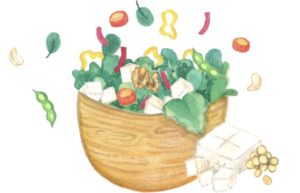
Eating a plant-based diet is not only beneficial to your health, it’s also good for the planet. Consuming fewer animal foods helps reduce greenhouse gas emissions and other environmental impacts. Try shifting your diet to a whole foods, plant-based approach at least a few times a month (I suggest more if you feel up for it). There are several variations to this type of diet which include:
- Vegan – Does not eat meat, poultry, fish, or any products derived from animals, including eggs, dairy products, and gelatin.
- Vegetarian (a.k.a. lacto-ovo vegetarian) – Does not eat meat, poultry, or fish, but does eat eggs and dairy products.
- Lacto-vegetarian – Does not eat meat, poultry, fish, or eggs, but does consume dairy products.
- Ovo-vegetarians – Does not eat meat, poultry, fish, or dairy products, but does eat eggs.
- Semi-vegetarian or flexitarian – May eat small amounts of meat, poultry, fish, and seafood; does consume eggs and dairy.
Cooking with plants is all about layering textures and flavors. Build your meals with grains, lots of color from fruits and veggies, and plant-based sources of protein like beans, tofu, tempeh, nuts, and seeds.
